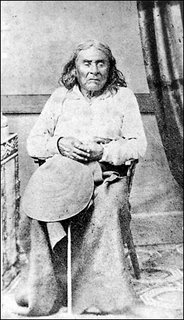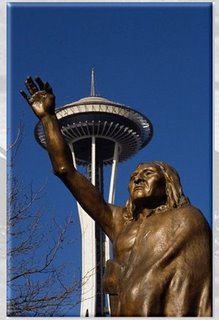 Chief Seattle (1786 – 1866) was a leader of the Suquamish and Duwamish Native American tribes in what is now the state of Washington in the United States of America. He was a prominent figure among his people and pursued a path of accommodation to white settlers, and formed a personal relationship with doctor David Swinson "Doc" Maynard, an advocate of Native America rights. It was at Maynard's suggestion that Seattle, Washington was named after the Chief.
Chief Seattle (1786 – 1866) was a leader of the Suquamish and Duwamish Native American tribes in what is now the state of Washington in the United States of America. He was a prominent figure among his people and pursued a path of accommodation to white settlers, and formed a personal relationship with doctor David Swinson "Doc" Maynard, an advocate of Native America rights. It was at Maynard's suggestion that Seattle, Washington was named after the Chief.
In 1851, Chief Seattle and other Native Indian tribes around Washington's Puget Sound, delivered what is considered to be one of the most beautiful and profound environmental statements ever made. Chief Seattle's speech was in response to a proposed treaty under which the Indians were persuaded to sell two million acres of land for $150,000."
The Speech:
How can you buy or sell the sky, the warmth of land? The idea is strange to us. If we do not own the freshness of the air and the sparkle of water how can you buy them? Every part of this earth is sacred to my people. Every shining pine needle, every sandy shore, every mist in the dark woods, every clearing and humming insect is holy in the memory and experience of my people. The sap, which courses through the trees, carries the memories of the red man.
The white man’s dead forget the country of their birth when they go to walk among the stars. Our dead never forget this beautiful earth, for it is the mother of the red man. We are part of the earth and it is part of us. The perfumed flowers are our sisters; the deer, the horse, the great eagle, these are our brothers. The rocky crests, the juices in the meadows, the body heat of the pony, and man – all belong to the same family.
So, when the Great Chief in Washington sends word that he wishes to buy our land, he asks much of us. The Great Chief sends word he will reserve us a place so that we can live comfortably to ourselves. He will be our father and we will be his children. So we will consider your offer to buy our land. But it will not be easy. For this land is sacred to us.
The shining water that move in the streams and rivers is not just water but the blood of our ancestors. If we sell you land, you must remember that it is sacred, and you must teach your children that it is sacred and that each ghostly reflection in the clear water of the lakes talks of events and memories in the life of my people. the water’s murmur is the voice of my father’s father.
The rivers are our brothers, they quench our thirst. The rivers carry our canoes, and feed our children. If we sell you our land, you must remember and teach your children that the rivers are our brothers and yours; and you must henceforth give the rivers the kindness you would give any brother.
We know that the white man does not understand our ways. One portion of the land is the same to him as the next, for he is a stranger who comes in the night and takes from the land whatever he needs. The earth is not his brother, but his enemy, and when he has conquered it he moves on. He leaves his father’s graves behind, and does not care. He kidnaps the earth from his children and he does not care. His father’s grave and his children’s birthright are forgotten. He treats his mother, the earth, and his brother, the sky, as things to be bought, plundered, sold like sheep or bright beads. His appetite will devour the earth and leave behind only a desert.
I do not know. Our ways are different from your ways. The sight of your cities pains the eyes of the red man. But perhaps it is because the red man is a savage and does not understand.
There is no quiet place in the white man’s cities. No place to hear the unfurling of leaves in spring, or the rustle of an insect’s wings. But perhaps it is because I am a savage and do not understand. The clatter only seems to insult our ears. And what is there to life if a man cannot hear the lonely cry of the whippoorwill or the arguments of the frogs around a pond at night? I am a red man and do not understand. The Indian prefers the soft sound of the wind darting over the face of a pond, and the smell of the wind itself cleansed by a mid-day rain or scented with the pinion pine.
The air is precious to the red man, for all things share the same breath –the beasts, the trees, the man; they all share the same breath. The white man does not seem to notice the air he breathes. Like a man dying for many days, he is numb to the stench. But if we sell you our land, you must remember that the air is precious to us, that the air shares its spirit with all the life it supports. The wind that gave our grandfather his first breath also receives his last sigh. And if we sell you our land, you must keep it apart and sacred, as a place where even the white man can go to taste the wind that is sweetened by the meadow’s flowers.
So we will consider your offer to buy our land. If we decide to accept, I will make one condition; the white man must treat the beasts of this land as his brothers. What is man without beasts? If all the beasts were gone, man would die from a great loneliness of spirit. For whatever happens to the beasts, soon happens to men. All things are connected.
You must teach your children that the ground beneath their feet is the ashes of our grandfather’s so that they will respect the land. Tell your children that the earth is rich with the lives of our kin. Teach your children what we have taught our children that the earth is our mother. Whatever befalls the earth befalls the sons of the earth. If men spit upon the ground, they spit upon themselves.
This we know; the earth does not belong to man; man belongs to the earth. This we know; all things are connected like the blood that unites one family. All things are connected; whatever befalls the earth befalls the sons of the earth. Man did not weave the web of life; he is merely a strand in it. Whatever he does to the web, he does to himself.
Even the white man, whose God walks and talks with him as friend to friend, cannot be exempt from the common destiny…We may be brothers after all. We shall see. One thing we know, which the white man may one day discovers – Our God is the same God. You may think now that you own him as you wish to own our land; but you cannot. He is the God of man, and His compassion is equal for the red and the white. This earth is precious to Him, and to harm the earth is to heap contempt on its creator. The white too shall pass; perhaps sooner than all other tribes. Contaminate your bed, and you will one night suffocate in your own waste.
But in your perishing you will shine brightly, fired by the strength of the God who brought you to this land and for some special purpose gave you dominion over the land and over the red man. That destiny is a mystery to us, for we do not understand. When the buffaloes are all slaughtered, the wild horses tamed, the secret corners of the forests heavy with the scent of many men and the view of the ripe hills blotted by talking vines…Where is the thicket? Gone! Where is the eagle? Gone! The end of living and the beginning of survival.
------------------------
A brief account of Chief Seattle's life:
The Chief Seattle was born around 1786 on Blake Island, Washington, and died in June 7, 1866, on the Suquamish reservation at Port Madison, Washington. His father, Schweabe, was a leader of the Suquamish tribe, and his mother was Scholitza of the Duwamish tribe.
Seattle earned his reputation at a young age as a leader and a warrior. He was very tall for a Puget Sound native at nearly six feet. He was also known as an orator, and his voice is said to have carried half a mile or more when he addressed an audience. He married well, taking wives from the village of Tola'ltu just southeast of Duwamish Head on Elliot Bay (now part of West Seattle). His first wife died after bearing a daughter. A second wife bore him sons and daughters. The most famous of his children was Princess Angeline. After the death of one of his sons, he sought and received baptism in the Roman Catholic Church, probably in 1848 near Olympia, Washington. His children were also baptized and raised in the faith, and his conversion marked his emergence as a leader seeking cooperation with incoming American settlers.
 In 1912, a local sculptor, James Wehn created the statue of Chief Seattle. Myrtle Loughery, the chief’s great great grand-daughter unveiled it on Founders Day, November 13 1912. It was renovated in 1975, and today the statue presides over Tilikum Place, near the Seattle Centre. (In the background is the Seattle Center Space Needle)
In 1912, a local sculptor, James Wehn created the statue of Chief Seattle. Myrtle Loughery, the chief’s great great grand-daughter unveiled it on Founders Day, November 13 1912. It was renovated in 1975, and today the statue presides over Tilikum Place, near the Seattle Centre. (In the background is the Seattle Center Space Needle)
"Man did not weave the web of life - he is merely a strand in it.Whatever he does to the web, he does to himself."
Chief Seattle, 1854
1 comment:
Chief seattle and Elizabeth Browing somehow look alike.. Are they related? Maybe your next article can be their family tree.
Post a Comment